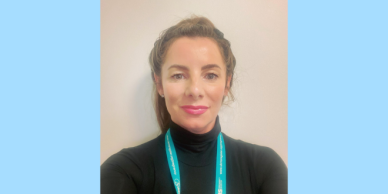Michelle Black, is an Advanced MS Champion based in St George’s University Hospital NHS Foundation Trust, Tooting and covering South West London and Surrey with her work. Nearly a year into her role, which is funded by the MS Trust, she is making significant strides forward in caring for people in the area living with advanced multiple sclerosis.
A typical day for Michelle is a blend of clinical work, advocacy, and administrative tasks. She begins her day by reviewing her schedule, prioritising urgent cases, and planning her route for home visits.
Home visits are a key part of Michelle's role. Visiting people in their own homes gives Michelle the opportunity to assess their needs in their daily lives and regular environment. The visits are often lengthy as it’s important to thoroughly understand the impact advanced MS is having on the person’s life and to enable Michelle to draw up a suitable care plan for that person.
“Seeing people in their own homes allows me to really get to know them. I saw a patient the other day and instantly recognised the signs of sepsis in him. This meant we were able to get him to hospital in time for him to make a full recovery.”
In between home visits, Michelle conducts telephone consultations to address urgent issues, provide advice, and schedule follow-up appointments. She also participates in multidisciplinary team meetings, which provide a link to other teams who will support with specific services. This approach ensures Michelle can create a holistic care plan which covers all aspects of her patients physical and mental wellbeing.
One of the most rewarding and impactful aspects of Michelle's role is the opportunity to advocate for the people with MS she cares for. Often people with advanced MS are physically or cognitively unable to navigate the system to promote their own interests. In these cases, Michelle is there to ensure the care that’s needed is put in place.
“I have one patient who has no movement from the neck down but is cognitively fine. He was struggling to carry on working and was having to dictate all his notes to his wife. His sitting position in his manual wheelchair was awful. By getting him a suitable wheelchair, he has increased his working hours from three mornings a week, to almost full time. It was a simple intervention, but invaluable in terms of preserving his sense of self and his independence.”
Advanced MS presents a unique set of challenges, including progressive disability, pain, fatigue, and cognitive impairment. Michelle's role as an Advanced MS Champion addresses these challenges and provides support to patients and their families.
One of the most common concerns which results in hospitalisation for people with advanced MS is aspiration pneumonia. Accidental inhalation of food, fluid, or saliva causes this type of pneumonia.
“This is such a difficult one for people with advanced MS to come to terms with. Food is such a pleasure in life, so to be told there are certain things you can’t eat, feels like such a huge restriction when you’ve already had so much taken away from you.”
Early identification and intervention to prevent this life-threatening infection is key and Michelle works closely with speech therapists, dieticians, and other healthcare professionals to develop personalised feeding plans and swallowing strategies.
Another big challenge for people with advanced MS is the risk of pressure sores. Michelle regularly assesses her patients' skin integrity and provides education on pressure relief techniques. She also works with occupational therapists to ensure patients have appropriate seating and positioning equipment.
As the landscape of MS care continues to evolve, Michelle believes that advanced practice nurses, such as herself, will play a crucial role in providing specialised care to people with advanced MS.
“I want to raise more awareness of this role. It needs to become established in the healthcare system, so for example GPs need to know that they can refer people with advanced MS to me.
There are millions of people living in the area I work, so there must be many people with MS I don’t yet know about. The people I see are already in the system as they have been referred by another healthcare professional. My aim is to also find the ones that we’re not currently getting to, the people that don’t realise this support is available in their area.”
You can read more about our Advanced MS Champion programme and all the other health professionals the MS Trust have funded here.
If you're affected by any of the symptoms mentioned in this article, you can find more information on them on our website.



